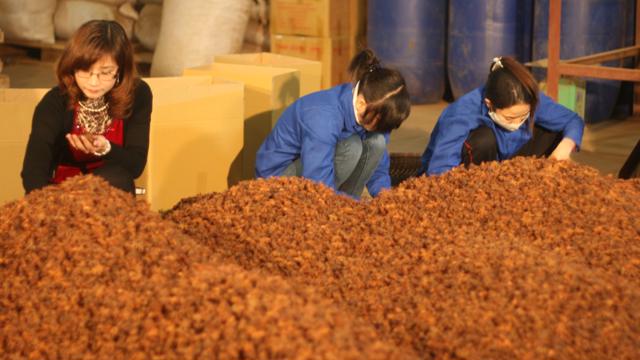[ad_1]
According to a report by the Vietnam Pepper Association (VPA), companies that are members of the VPA have recently traded and exported agricultural products to the UAE, including pepper, cinnamon, anise and cashew nuts.
However, these companies said the transactions showed signs of commercial fraud by the same buyer and bank based in Dubai, United Arab Emirates.
Earlier, four containers worth $400,000 were lost at Jebel Ali Port in the United Arab Emirates. Currently, 1 container of anise flowers is likely to be lost (the goods are expected to arrive at the port on July 26, 2023) due to the same scam.
For example the case of the Tin Mai Company – a VINACAS member suspected of being scammed when exporting cashew nuts. Tin Mai Company signed an agreement to sell cashew nuts to BAB AL REHAB FOODSTUFF TRADING LLC, OFFICE NO. 1006 MAY TOWER, AL NAHDA, DUBAI, United Arab Emirates.
The partner has advanced 15% of the contract value. Tin Mai Company delivered the goods and arrived at Jebel Ali Port in the United Arab Emirates on June 24, 2023. The goods were picked up on June 27, 2023 and returned to the empty container while the Tin Mai Company has still not been paid for 85% of the shipment value.
Although Sacombank sent two messages (Swift) to the buyer’s bank, AJMAN BANK PJSC – Sheikh Zayed Road Dubai Branch asking for payment and refund of the documents, but failed to execute.
Through the inspection, it is known that the document of the shipment was handed over by DHL to a security officer at AJMAN BANK PJSC – Sheikh Zayed Road Dubai Branch, however, it is not known where the documents came from. The forwarding agent stated that they would deliver the goods when all the required documents were submitted.
According to the payment terms specified in the contract, all shipments are paid according to the payment terms for pickup (D/P). This means that the original documents are transferred from the seller’s bank to the buyer’s bank and then the buyer makes the payment to the buyer’s bank.
After the buyer’s bank has received the full amount, it simultaneously transfers the money to the seller’s bank. Only then is the buyer’s bank permitted to hand over the original documents to the buyer for receipt of the goods.
However, if the buyer’s bank has not transferred the money to the seller’s bank, the buyer will not be able to receive the original documents for picking up the goods at the port. “Therefore, the above transactions show signs of fraud at the bank to which the Vietnamese company sent the D/P documents. These bank officials could be involved in this case,” the Department of Industry and Trade said.
Immediately after receiving the notification from the above entities, the Ministry of Industry and Trade (Africa Market Department) sent a notification to the Embassy of the United Arab Emirates in Hanoi, requesting the Embassy to notify the relevant authorities in order to examine and process the case.
On July 25, 2023, the Ministry of Industry and Trade had an urgent meeting with the Ambassador of the United Arab Emirates to Vietnam, representatives of the following entities: the Central Bank of Vietnam, the Vietnam Pepper Association, the Import-Export Department and companies that own export shipments to Dubai.
The Ministry of Industry and Trade has instructed the Vietnam Trade Office in the UAE to process the above case soon. The deal has sent notices to the UAE Ministry of Foreign Affairs, Dubai Police, the UAE Central Bank and a number of associated banks and shipping companies; cooperate with the relevant bank branch in Dubai; cooperate with Dubai Police and submit a case report; Cooperate with shipping companies and authorities of Jebel Ali Port.
To avoid unfortunate losses, the Ministry of Industry and Trade has advised companies on transactions involving invoices and receipts…in high-risk markets.
The Ministry of Industry and Trade said that fraud in the Middle East market is now more prevalent than before and is mainly focused on small trading companies.
The most common form of fraud today is that foreign companies often require TT (postpaid) payment terms or write checks to the mortgage seller when signing sales contracts with Vietnamese companies. These are the two riskiest forms.
TT payment means the buyer receive the goods and then pay the seller. Also, write checks that are valid for a certain period of time, and then give them to the seller as collateral. This method has many risks because the buyer writes a check with no money in the account; The seller cannot go to the buyer’s bank to collect the money because there is no ID card.
The seller also cannot verify the buyer’s account information as banks in some Middle East countries do not share customer information with third parties.
Therefore, the Ministry of Industry and Trade recommends Vietnamese companies to be careful when dealing with foreign companies and to carefully negotiate payment terms to ensure the greatest possible security. Secure payment methods such as opening LC or a company representative to deliver documents and receive money.
The D/P payment method is also safer than TT payment and check, but this ministry points out that the seller’s banks must ensure security when sending documents to the buyer’s bank to avoid the case like the above cases, because the delivery of documents and receipt of documents (bank security personnel) do not sign and receive, resulting in the bank security personnel will not hand over the documents to the buyer to pay the buyer.
[ad_2]
Source link

